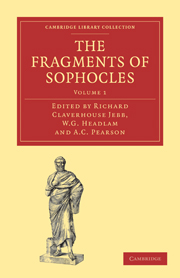GENERAL INTRODUCTION
Published online by Cambridge University Press: 07 September 2010
Summary
The number of the plays
External evidence
The anonymous Life of Sophocles records on the authority External of Aristophanes of Byzantium that 130 plays were attributed to Sophocles, but that 17 of these were spurious. The statement is entitled to credit, as coming from Aristophanes; and it has been referred with high probability to his work entitled πρὸς ποὺς Καλλιμάχου πίνακας. Not much is known of the book in question, but it may be taken to have contained corrections and enlargements of the well-known πίνακες of Callimachus, which was not merely a catalogue of the books contained in the Alexandrian library, but included biographical details concerning the various authors, and in the case of the Attic drama the dates of the production of the several plays, as well as other points of interest drawn from the διδασκαλίαι of Aristotle.
Suidas, however, reports that Sophocles produced 123 plays, and according to some authorities considerably more. This information may be reconciled with the Life in two ways, i.e. by the adoption either of Boeckh's correction of Suidas, which makes the total 113 (ριγ′ in place of ρκγ′), or of Bergk's substitution of 7 for 17 (ζ′ for ιζ′) in the Life. The latter proposal is palaeographically the easier, and the number 123 agrees better than 113 with the remaining data, as will presently appear.
Number of victories
The number of his victories is also variously recorded. According to Suidas, they were twenty-four; according to the Life, which followed the authority of Caristius of Pergamum, twenty; and, according to Diodorus, only eighteen. The lastmentioned statement is now confirmed by the evidence of a recently discovered inscription.
- Type
- Chapter
- Information
- The Fragments of Sophocles , pp. xiii - cPublisher: Cambridge University PressPrint publication year: 2010First published in: 1917



